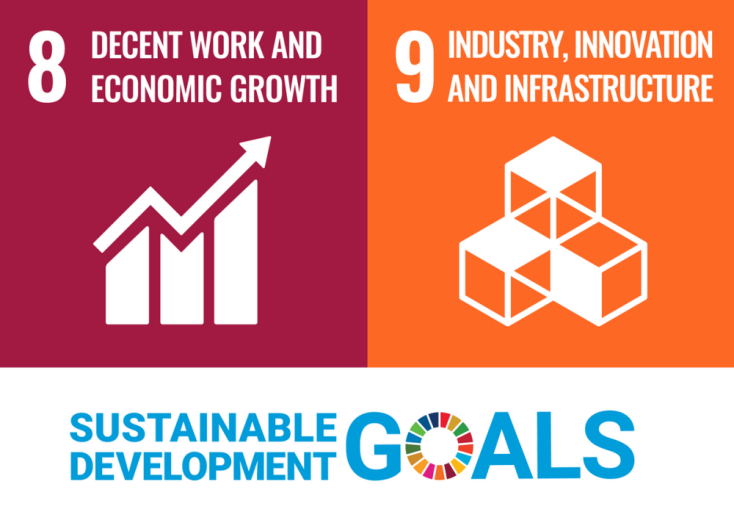What role media play in fostering economic growth? As the Global Week to #Act4SDGs continues, we publish excerpts from our brief “The role of media: Driving change towards the SDGs”. Here we discuss the relationship between media and the SDG 8: Decent Work and Economic Growth and SDG 9: Industry, Innovation and Infrastructure.
“Free and independent media can expose corruption in government and the corporate sector, provide a voice for citizens to be heard, help build public consensus to bring about change, and enable markets to work better by providing reliable economic information”
– Joseph Stiglitz, Nobel Prize laureate in Economics[i]
Numerous studies have identified a relationship between access to a free press and economic growth[ii], with more press freedom being positively correlated with higher GDP per capita[iii]. Attacks on press freedom have measurable effects on economic growth, with evidence suggesting that countries that record a decrease in press freedom also experience a 1%-2% drop in GDP growth[iv]. Greater state ownership of the media has been found to hurt economic governance, leading to weaker property rights and a higher likelihood of seizure of assets[v].
By exposing malfeasance and financial scandals, media promote accountability in the public and corporate sector, curb corruption which undermines economic activity[vi], and create a favourable investment climate leading to higher foreign domestic investment[vii]. Free media stimulate business regulatory reforms[viii], facilitate the development of sound economic policy[ix] and improve governance and government effectiveness[x] — conditions that are important for robust economic development. On a micro-level, media also provide reliable information, such as market prices for producers, encouraging commerce and economic activity.
Below we present case studies of impactful journalism and information sharing done by MDIF clients done in the area of SDG 8 and 9 as real-world examples that illustrate the transformative power of media.
Examples of impact
In Malaysia, digital outlet Malaysiakini investigated the abuse and labour exploitation of migrant workers, tracking their journey from their original homes to ultimate destinations and investigating the money trail that led to those involved. Just two days after publication of the article that exposed “slave-like conditions” faced by workers at a factory in Klang, Malaysia, a joint operation was conducted by the police, immigration officers and the Labour Department, leading to the rescue of the workers. Charges were brought against the factory owner. There was also a crackdown on the main supply chain – companies involved in recruiting and sending the workers to Malaysia.
In South Africa, the Daily Maverick’s investigative journalism played a large part in exposing how a reputable management consultancy was involved in shady graft-tainted state contracts. Over several years, the Daily Maverick released investigative reports dubbed “the McKinsey dossier” and repeatedly provided evidence that the consulting firm allowed itself to be used in the laundering networks of the wealthy and politically-connected Gupta family. In 2021, the work of investigative journalists and whistleblowers combined with a public willing to listen to produce tangible results when the Zondo Commission — a state-sponsored inquiry into allegations of corruption during former president Jacob Zuma’s 9-year tenure — presented evidence of irregularities in McKinsey’s contracts with government-owned companies. The consultancy firm agreed to repay $63 million that it earned on the contracts tainted by state capture.
Read the full brief “The role of media: Driving change towards the SDGs” here.
[i] Stiglitz, J. Islam, R (2002). “Third World development strategies : A free press is crucial in overcoming global poverty”. The New York Times
[ii] Stiglitz, J (2002). “Transparency in Government,” in World Bank (2002). “The Right to Tell: The Role of Mass Media in Economic Development”. WBI Development Studies; Bjørnskov, C (2018). “The Hayek Friedman Hypothesis on the Press: Is There an Association between Economic Freedom and Press Freedom?”. Journal of Institutional Economics.
[iii] Guseva, M et al. (2008). “Press freedom and development: an analysis of correlations between freedom of the press and the different dimensions of development, poverty, governance and peace”. United Nations Educational Scientific and Cultural Organization.
[iv] Nguyen, J. Valadkhani, A. Nguyen, A. Wake, A (2021). “Press Freedom and the Global Economy: The Cost of Slipping Backwards” Journalism Studies.
[v] Djankov, S., McLiesh, C., Nenova, T., & Shleifer, A (2003). “Who owns the media?”. The Journal of Law and Economics.
[vi] Norris, P (2006). “The Role of the Free Press in Promoting Democratization, Good Governance, and Human Development”.
[vii] Alam, A, Ali Shah, S (2013). “The role of press freedom in economic development: A global perspective”. Journal of Media Economics; Pal, S., Dutta, N., & Roy, S (2011). “Media freedom, socio-political stability and economic growth”
[viii] Ramalho, R., & Saltane, V (2019). “Does Media Stimulate Reform Efforts?”. World Bank Policy Research Working Paper.
[ix] Christopher J. Coyne and Peter T. Leeson (2004). “Read all about it! Understanding the role of media in economic development”. Kyklos.
[x] García-Sánchez, I.-M., Cuadrado-Ballesteros, B., & Frías-Aceituno, J.-V (2016). Does media freedom improve government effectiveness? A comparative cross-country analysis”. European journal of law and economics; Pippa Norris (2006). “The Role of the Free Press in Promoting Democratization, Good Governance, and Human Development”.
